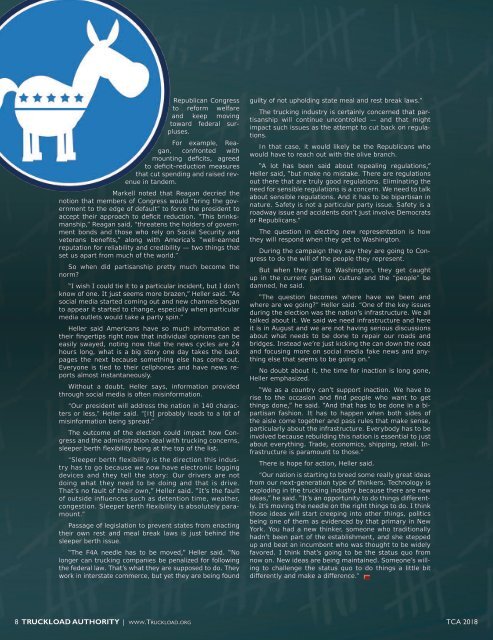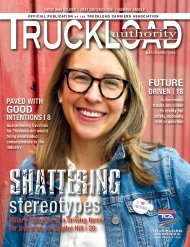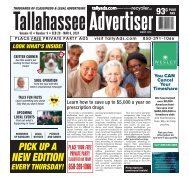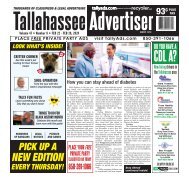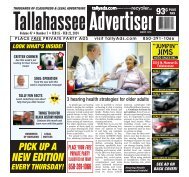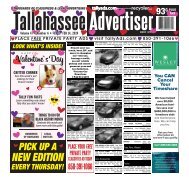Truckload Authority - August/September 2018
You also want an ePaper? Increase the reach of your titles
YUMPU automatically turns print PDFs into web optimized ePapers that Google loves.
Republican Congress<br />
to reform welfare<br />
and keep moving<br />
toward federal surpluses.<br />
For example, Reagan,<br />
confronted with<br />
mounting deficits, agreed<br />
to deficit-reduction measures<br />
that cut spending and raised revenue<br />
in tandem.<br />
Markell noted that Reagan decried the<br />
notion that members of Congress would “bring the government<br />
to the edge of default” to force the president to<br />
accept their approach to deficit reduction. “This brinksmanship,”<br />
Reagan said, “threatens the holders of government<br />
bonds and those who rely on Social Security and<br />
veterans benefits,” along with America’s “well-earned<br />
reputation for reliability and credibility — two things that<br />
set us apart from much of the world.”<br />
So when did partisanship pretty much become the<br />
norm?<br />
“I wish I could tie it to a particular incident, but I don’t<br />
know of one. It just seems more brazen,” Heller said. “As<br />
social media started coming out and new channels began<br />
to appear it started to change, especially when particular<br />
media outlets would take a party spin.”<br />
Heller said Americans have so much information at<br />
their fingertips right now that individual opinions can be<br />
easily swayed, noting now that the news cycles are 24<br />
hours long, what is a big story one day takes the back<br />
pages the next because something else has come out.<br />
Everyone is tied to their cellphones and have news reports<br />
almost instantaneously.<br />
Without a doubt, Heller says, information provided<br />
through social media is often misinformation.<br />
“Our president will address the nation in 140 characters<br />
or less,” Heller said. “[It] probably leads to a lot of<br />
misinformation being spread.”<br />
The outcome of the election could impact how Congress<br />
and the administration deal with trucking concerns,<br />
sleeper berth flexibility being at the top of the list.<br />
“Sleeper berth flexibility is the direction this industry<br />
has to go because we now have electronic logging<br />
devices and they tell the story: Our drivers are not<br />
doing what they need to be doing and that is drive.<br />
That’s no fault of their own,” Heller said. “It’s the fault<br />
of outside influences such as detention time, weather,<br />
congestion. Sleeper berth flexibility is absolutely paramount.”<br />
Passage of legislation to prevent states from enacting<br />
their own rest and meal break laws is just behind the<br />
sleeper berth issue.<br />
“The F4A needle has to be moved,” Heller said. “No<br />
longer can trucking companies be penalized for following<br />
the federal law. That’s what they are supposed to do. They<br />
work in interstate commerce, but yet they are being found<br />
guilty of not upholding state meal and rest break laws.”<br />
The trucking industry is certainly concerned that partisanship<br />
will continue uncontrolled — and that might<br />
impact such issues as the attempt to cut back on regulations.<br />
In that case, it would likely be the Republicans who<br />
would have to reach out with the olive branch.<br />
“A lot has been said about repealing regulations,”<br />
Heller said, “but make no mistake. There are regulations<br />
out there that are truly good regulations. Eliminating the<br />
need for sensible regulations is a concern. We need to talk<br />
about sensible regulations. And it has to be bipartisan in<br />
nature. Safety is not a particular party issue. Safety is a<br />
roadway issue and accidents don’t just involve Democrats<br />
or Republicans.”<br />
The question in electing new representation is how<br />
they will respond when they get to Washington.<br />
During the campaign they say they are going to Congress<br />
to do the will of the people they represent.<br />
But when they get to Washington, they get caught<br />
up in the current partisan culture and the “people” be<br />
damned, he said.<br />
“The question becomes where have we been and<br />
where are we going?” Heller said. “One of the key issues<br />
during the election was the nation’s infrastructure. We all<br />
talked about it. We said we need infrastructure and here<br />
it is in <strong>August</strong> and we are not having serious discussions<br />
about what needs to be done to repair our roads and<br />
bridges. Instead we’re just kicking the can down the road<br />
and focusing more on social media fake news and anything<br />
else that seems to be going on.”<br />
No doubt about it, the time for inaction is long gone,<br />
Heller emphasized.<br />
“We as a country can’t support inaction. We have to<br />
rise to the occasion and find people who want to get<br />
things done,” he said. “And that has to be done in a bipartisan<br />
fashion. It has to happen when both sides of<br />
the aisle come together and pass rules that make sense,<br />
particularly about the infrastructure. Everybody has to be<br />
involved because rebuilding this nation is essential to just<br />
about everything. Trade, economics, shipping, retail. Infrastructure<br />
is paramount to those.”<br />
There is hope for action, Heller said.<br />
“Our nation is starting to breed some really great ideas<br />
from our next-generation type of thinkers. Technology is<br />
exploding in the trucking industry because there are new<br />
ideas,” he said. “It’s an opportunity to do things differently.<br />
It’s moving the needle on the right things to do. I think<br />
those ideas will start creeping into other things, politics<br />
being one of them as evidenced by that primary in New<br />
York. You had a new thinker, someone who traditionally<br />
hadn’t been part of the establishment, and she stepped<br />
up and beat an incumbent who was thought to be widely<br />
favored. I think that’s going to be the status quo from<br />
now on. New ideas are being maintained. Someone’s willing<br />
to challenge the status quo to do things a little bit<br />
differently and make a difference.”<br />
8 <strong>Truckload</strong> <strong>Authority</strong> | www.<strong>Truckload</strong>.org TCA <strong>2018</strong>


